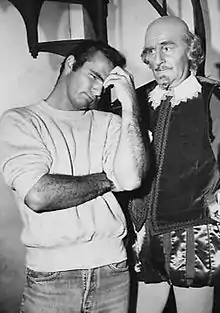The Bard (The Twilight Zone)
"The Bard" is an episode of the American television anthology series The Twilight Zone. It was the final episode of The Twilight Zone to be one hour long. A direct satire of the American television industry, the episode features a parody of Marlon Brando by his look-alike Burt Reynolds, and concerns an inept screenwriter who, through the use of black magic, employs William Shakespeare as his ghostwriter.
| "The Bard" | |
|---|---|
| The Twilight Zone episode | |
 Burt Reynolds and John Williams in a scene from "The Bard". | |
| Episode no. | Season 4 Episode 18 |
| Directed by | David Butler |
| Written by | Rod Serling |
| Featured music | Fred Steiner |
| Production code | 4852 |
| Original air date | May 23, 1963 |
| Guest appearance(s) | |
Opening narration
You've just witnessed opportunity, if not knocking, at least scratching plaintively on a closed door. Mr. Julius Moomer, a would-be writer who, if talent came twenty-five cents a pound, would be worth less than car fare. But, in a moment, Mr. Moomer, through the offices of some black magic, is about to embark on a brand-new career. And although he may never get a writing credit on the Twilight Zone, he's to become an integral character in it.
Plot
A bumbling screenwriter, Julius K. Moomer, is becoming desperate for a sale after years working on unproduced scripts. When his agent mentions that he is submitting another writer's pitch for a television series about black magic, Julius pleads to be allowed to be given first crack at the series. Knowing nothing about the subject, he attempts some research but turns up only an actual book of black magic. While experimenting with the book he accidentally conjures William Shakespeare, who says he is at the service of the conjurer. Deciding not to waste Shakespeare's talent on a television pilot, Julius directs him to write a film.
The producers decide that Shakespeare's script, "The Tragic Cycle", though archaic to the point of being almost incomprehensible, has potential. His task finished, Shakespeare proposes to leave. Julius argues that if he stops writing now Shakespeare will lose his chance at Hollywood fame and become forgotten. Shakespeare at last says he will attend a rehearsal for the film and stay on if it does justice to his script. At the rehearsal he is so horrified at the revisions by the sponsor that he assaults the leading man and storms out. Julius's next assignment, a TV special on American history, seems doomed to failure until he remembers his book on black magic, and uses it to conjure up Robert E. Lee, Ulysses S. Grant, Abraham Lincoln, George Washington, Pocahontas, Daniel Boone, Benjamin Franklin, and Theodore Roosevelt to act as consultants.
Closing narration
Mr. Julius Moomer, a streetcar conductor with delusions of authorship. And if the tale just told seems a little tall, remember a thing called poetic license, and another thing called the Twilight Zone.
Cast
- Jack Weston as Julius Moomer
- John Williams as William Shakespeare
- Burt Reynolds as Rocky Rhodes
- Henry Lascoe as Gerald Hugo
- John McGiver as Mr. Shannon
- Howard McNear as Bramhoff
- Judy Strangis as Cora
- Marge Redmond as Secretary
- Doro Merande as Sadie
- William Lanteau as Dolan
- Clegg Hoyt as Bus driver
- John Newton as TV interviewer
- John Bose as Daniel Boone (uncredited)
- Rudy Bowman as Robert E. Lee (uncredited)
Notes: Weston and McGiver were previously in earlier episodes, "The Monsters Are Due on Maple Street" and "Sounds and Silences"
Production history
The episode was likely written by Rod Serling as a reaction to the advertising executives he dealt with regularly while producing for television. In the book The Twilight Zone Companion Serling is quoted as saying that things were so bad with the overcautious executives that "one could not ford a river if Chevy was the sponsor."
The actor portrayed by Burt Reynolds satirizes Marlon Brando's way of method acting, augmented by the close physical resemblance between Reynolds and Brando during that period.
The episode was also featured in the final episode of The Sopranos, in 2007, "Made in America". Tony Soprano, the protagonist of the series, is seen watching this episode while in hiding from his enemies in a safe house.
References
- Zicree, Marc Scott: The Twilight Zone Companion. Sillman-James Press, 1982 (second edition)
- DeVoe, Bill. (2008). Trivia from The Twilight Zone. Albany, GA: Bear Manor Media. ISBN 978-1-59393-136-0
- Grams, Martin. (2008). The Twilight Zone: Unlocking the Door to a Television Classic. Churchville, MD: OTR Publishing. ISBN 978-0-9703310-9-0
External links
- "The Bard" at IMDb
- "The Bard" at TV.com
